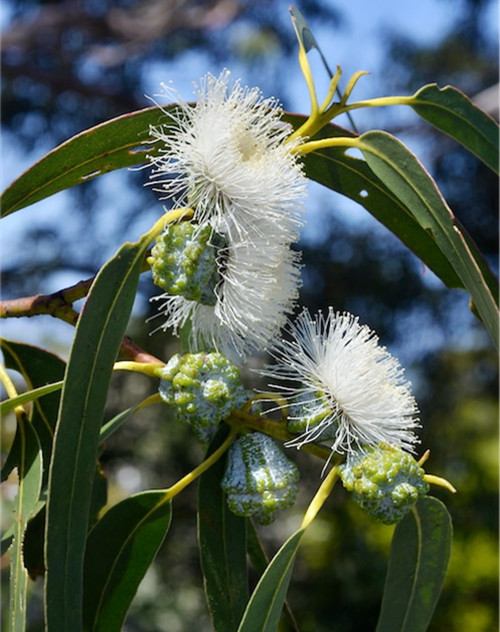You may already know that eucalyptus oil is recommended to treat a variety of respiratory symptoms due to its natural decongestant and antiseptic properties. You can choose from a variety of eucalyptus leaf products, including concentrated essential oils, tinctures, teas or eucalyptus leaf extract powders. Eucalyptus oil is commonly used forms used in a number of ways, including aromatherapy and in an essential oil diffuser. It is highly concentrated and has a strong, refreshing scent. Do you know what’s the benefits of eucalyptus extract oil? Ok, let’s start with the question” eucalyptus extract oil”?
Eucalyptus leaves come from eucalyptus plants (most commonly Eucalyptus globulus), which are actually several related species in the Myrtle plant family, primarily native to Australia, with most types being evergreens. Aboriginal people in Australia have used eucalyptus trees for hundreds of years for medical uses. Almost all parts of the plant have medicinal properties, including oily leaves, bark and roots. Its leaves usually start as a light green oval, turning dark green as the plant matures. These leaves are covered in oil glands and have a natural menthol odor, similar to mint leaves, and they contain many beneficial compounds found mainly in the plant’s volatile essential oils. Some popular uses of eucalyptus leaves include:
- Soothe cold and flu symptoms;
- Add to massage oil and bath additives to promote skin health;
- Consumed as a tea to relieve congestion;
- Add a fresh menthol aroma to your home when used in aromatherapy.
- Since eucalyptus leaves contain compounds such as cineole and flavonoid antioxidants, they have been found to have antibacterial, antiseptic and expectorant properties.
Eucalyptus leaf oil extract is rich in antioxidants and antibacterial compounds such as protective terpenes, flavonoids and other antioxidants, including:
- Cineole
- Catechin
- Quercetin
- Isorhamnetin
- Luteolin
- Limonene
- Kaempferol
- Phloretin
Due to the anti-inflammatory effects of these compounds, they can often help fight oxidative stress and support the immune system, and they may also have analgesic properties that may help reduce joint pain when used topically. Cineole is a particularly valuable compound present in these leaves, which has been shown to have antibacterial effects against many bacteria, including Mycobacterium tuberculosis and methicillin-resistant Staphylococcus aureus (MRSA), as well as viruses and fungi (including Candida).
Relieve pain
Among the many benefits of eucalyptus oil are its antimicrobial and anti-inflammatory properties, one of the most important benefits of eucalyptus essential oil is its ability to soothe and relieve headaches and muscle stiffness. This can be achieved by adding a few drops of the oil to a cloth and inhaling it. If you are suffering from a headache, you can also apply a few drops of the oil directly to the temples. When applied topically, it can help with inflammation and rashes, as well as relieve itching from insect bites.
Help with respiratory problems
According to research, eucalyptus is an excellent natural remedy for common respiratory problems including cough, sore throat, nasal congestion and mucus buildup, upper respiratory infections, and asthma symptoms associated with chronic obstructive pulmonary disease (COPD). A particular terpenoid compound found in these leaves, called cineole, has been shown in some studies to help improve asthma symptoms. In one study, 600 milligrams of eucalyptus oil per day was compared to a placebo over a 12-week period. The group taking cineole had a significantly greater reduction in the need for steroid drugs used to control symptoms than the placebo group. The researchers involved in the study attributed the anti-inflammatory effects of cineole to the observed improvement in asthma symptoms. Cineole has been found to inhibit arachidonic acid metabolism and cytokine production, two factors that can lead to severe asthma. Another benefit of inhaling the scent of this plant is that it can help promote relaxation and reduce anxiety and blood pressure.
Support healthy skin
Eucalyptus leaf extract has therapeutic properties when applied to dry or sensitive skin. Some studies have shown that it can increase ceramide production in the skin, which increases moisture and forms a protective barrier, reducing dryness, redness, itching and scaling. One study found that applying a lotion containing eucalyptus extract topically to participants’ dry and scaly scalps helped improve quality of life and symptoms associated with atopic dermatitis, seborrheic dermatitis, or pityriasis of the scalp.
Promote dental health
In addition to soothing damaged skin, eucalyptus leaves can help with periodontal health by cleaning the inside of your mouth. It is sometimes added to mouthwash and gums to help prevent plaque buildup, clean gums and reduce bleeding, and to help control inflammation and bacterial growth that can lead to gum disease.
Write in last, the oil has been used to treat burns, bacterial dermatitis, and sepsis. It also can be used to clear your air of dust, smoke, and bacteria because it can help clean household surfaces by reducing bacteria and helping to protect them from spoilage yeast. You’d better consult with your doctor if you have any medical conditions before using it. Also, do not use the oil if you are pregnant or breastfeeding. The oil can also interfere with other medications.




